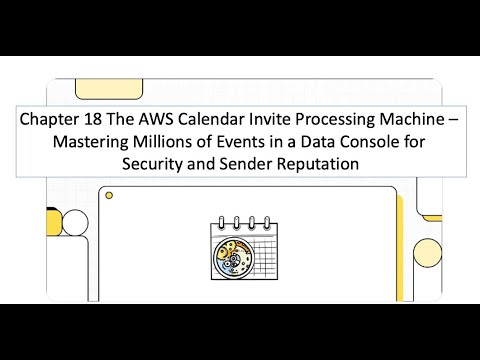1. What is the primary purpose of the Event Management module in the Calendar Invite Server (CIS)?
The Event Management module in the Calendar Invite Server (CIS) provides a comprehensive set of functions to manage the entire lifecycle of events efficiently. This includes the creation, modification, and processing of events and their associated invitations, while strictly maintaining data integrity and enforcing various validation rules. Essentially, it automates and streamlines all aspects of event coordination, from initial setup to attendee management and notifications.
2. Which AWS services are leveraged by the Event Management module to achieve its functionalities?
The Event Management module utilizes several key AWS services for its operations:
AWS Lambda: Responsible for handling the core event management processing logic.
Amazon SQS (Simple Queue Service): Manages event-related requests in a queue, ensuring reliable and asynchronous processing.
Amazon DynamoDB: Used for storing and updating all event and attendee records, providing a highly scalable and flexible NoSQL database.
Amazon SNS (Simple Notification Service): Publishes notifications for various event-related actions, allowing for widespread distribution of alerts.
Amazon SES (Simple Email Service): Facilitates the sending of all event invitations, cancellations, and updates via email.
3. What are the core functionalities offered by the Event Management module?
The module provides core functionalities across several key areas:
Event Creation & Verification: This involves creating new event records and verifying event invite requests to ensure authorization.
Event Invite Management: Handles sending individual and bulk calendar invites, processing new event requests/invites received via email, and notifying organizers of successful event creation.
Event Update & Cancellation: Manages updating event details, sending notifications of changes or cancellations to attendees, and staging attendees for these notifications.
RSVP & Attendee Management: Processes attendee responses (RSVPs) received via email, updates attendee RSVP statuses, and notifies organizers about event creation failures, limits reached, or successful enrollment.
4. How does the workflow typically operate for event creation, updates, and RSVP management?
The workflow for the Event Management module follows a structured process:
Event Creation: A new event is created and verified, followed by the sending of invitations (either individually or in bulk) to attendees. Organizers receive confirmation once the event is successfully created.
Event Updates & Cancellations: Any modifications to event details automatically trigger notifications to relevant attendees. Similarly, event cancellations result in pre-staged notifications being sent to all attendees.
RSVP & Attendee Management: Attendee responses (RSVPs) are processed and recorded in DynamoDB. Organizers are then notified based on the event's status, such as success, failure, or if event creation limits have been reached.
Email-Based Processing: The system is designed to handle event requests and RSVP responses directly via email integrations, and it can also process bulk event invites from CSV attachments in emails.
5. What types of data does the Event Management module handle and validate?
The module handles critical data records stored in DynamoDB:
Event Record (event#): Tracks all details related to an event, including timestamps and current status.
Attendee Record (attendee#): Stores attendee information and their RSVP history for each event.
Organizer Statistics (organizer#): Maintains records related to an organizer's event creation limits and invitation statistics.
For validation, the module ensures:
Organizers are authorized before sending invitations.
Duplicate invitations are not sent to the same attendee.
Attendee RSVP responses are verified before updating their records.
6. What environmental variables are crucial for the Event Management module's operation?
The module relies on several environmental variables for configuration and operation:
REGION: Specifies the AWS Region where the services are executed.
DYNAMODB_TABLE: The name of the DynamoDB table used for storing data.
SQS_URL: The URL of the SQS queue responsible for processing event requests.
NEW_EVENT_INVITE: The SNS topic ARN for approved event invites.
EVENT_UPDATED: The SNS topic ARN for event updates.
EVENT_CANCELLATION_REQUEST: The SNS topic ARN for event cancellation requests.
SENDER: The email address used to send event-related notifications.
RSVP_EMAIL: The specific email address designated for collecting RSVP responses.
7. How does the Event Management module handle various errors that may occur during its operations?
The module incorporates robust error handling mechanisms:
Invalid Requests: Issues like missing required fields are logged, and processing for such requests is skipped.
Authorization Failures: The system prevents event invitations from being sent by unauthorized organizers or suspended accounts.
Processing Failures: Errors encountered during processing are logged, and the failed messages are retained in SQS for potential retries.
Notification Failures: Problems with sending invites or updates are logged, but these failures do not halt the overall execution of the system.
8. What is the overall benefit of using the Event Management module within the Calendar Invite Server?
The Event Management module in CIS provides a robust and scalable solution for managing the entire event lifecycle. By integrating AWS Lambda, SQS, DynamoDB, SNS, and SES, it offers automated and efficient handling of event creation, invitations, updates, cancellations, and RSVP tracking. This comprehensive approach ensures seamless coordination between event organizers and attendees, while also enforcing crucial validation and security measures, ultimately streamlining event operations and improving reliability.












